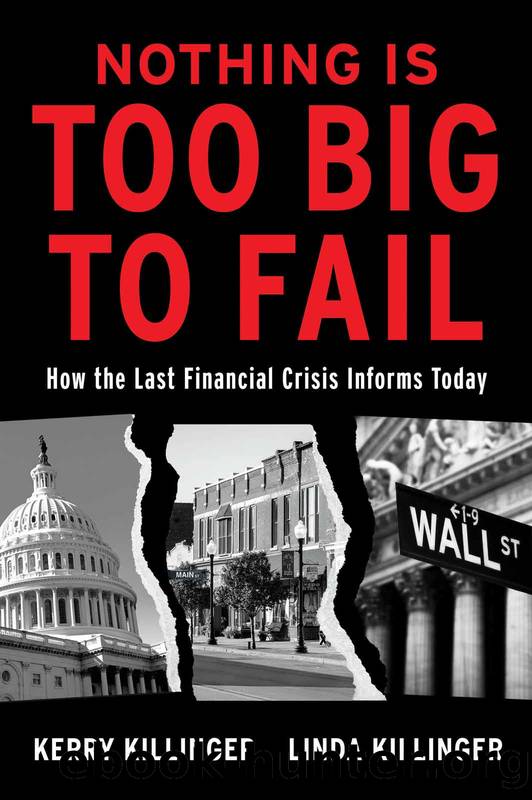Nothing Is Too Big to Fail: How the Last Financial Crisis Informs Today by Kerry Killinger & Linda Killinger

Author:Kerry Killinger & Linda Killinger [Killinger, Kerry & Killinger, Kerry]
Language: eng
Format: epub
Publisher: RosettaBooks LLC
Published: 2021-03-15T00:00:00+00:00
Kerry and the team saw the 2008 crisis coming and developed plans for extensive information sessions with major stakeholders. During past crises, there was usually a certain amount of stress, anxiety, and fatigue, but Kerry knew this crisis was going to be much tougher. Many bank CEOs, including Kerryâduring and after the crisisâcommented on how difficult the crisis was for their executive team. Execs who used to be independent and decisive now turned to Kerry frequently to help them make their decisions. Some people who used to be open and forthcoming became secretive. Execs who had always focused on the bankâs best interests became ever more focused on protecting their own interests. Everyone played out their pain in a different way, and Kerry worked hard to maintain a level head and help his executives through the crisis.
However, Kerry was about to experience one of his biggest disappointments ever.
On November 1, Kerry was in an executive meeting preparing for Investorsâ Day when he was told the New York attorney general had just held a press conference and announced he was suing real estate appraisal companies for conspiring with banks, including Washington Mutual, to inflate values on appraisals. Kerry and the executives were shockedâthey hadnât heard a word about this. The AGâs office had never called or contacted them to investigate or confirm any information. They were shocked because there would be no incentive for the bank to want to inflate appraisals. Additionally, Kerry had initiated the process of farming out appraisals to independent companies to avoid any potential conflict of interest. The regulators applauded and approved this change, because having the bankâs employees appraise the value of a home was a clear conflict of interest.
Kerry immediately called his longtime general counsel, Fay Chapman, to investigate the allegations and find out what was going on. Kerry had trusted his general counsel for two decades. She was acerbic, thorough, and prickly about looking at every detail. Through the years some of the board members had wanted her replaced because they thought she was too cantankerous and stubborn, but Kerry always defended her. He wouldnât sign a paper, approve a policy, or give a speech without her written legal approval. After touching base with Chapman, Kerry went into full action mode to address the issue.
He immediately called the OTS to ask them to investigate the charges. He contacted the AGâs office and offered full cooperation and hired the New York law firm Simpson, Thacher, and Bartlett to conduct a full investigation of the appraisal activities. He also released a statement to the press, opening up about his surprise and disappointment in the allegations:
We have suspended our relationship with [the appraisal company] and will investigate the situation. We have absolutely no incentive to have appraisers inflate home values. In fact, inflated appraisals are contrary to our interests. We use third party appraisal companies to make sure appraisals are objective and accurate.
Shortly after the New York law firm was engaged, Kerry received a call from Simpson Thacherâs senior partner, claiming the bankâs general counsel was impeding their investigation.
Download
This site does not store any files on its server. We only index and link to content provided by other sites. Please contact the content providers to delete copyright contents if any and email us, we'll remove relevant links or contents immediately.
Rich Dad Poor Dad by Robert T. Kiyosaki(6632)
Pioneering Portfolio Management by David F. Swensen(6300)
How To Win Friends and Influence People by Dale Carnegie(4513)
The Money Culture by Michael Lewis(4207)
The Dhandho Investor by Mohnish Pabrai(3765)
The Wisdom of Finance by Mihir Desai(3747)
Liar's Poker by Michael Lewis(3449)
Fooled by Randomness: The Hidden Role of Chance in Life and in the Markets by Nassim Nicholas Taleb(3124)
The ONE Thing by Gary Keller(3071)
Mastering Bitcoin: Programming the Open Blockchain by Andreas M. Antonopoulos(3045)
The Intelligent Investor by Benjamin Graham Jason Zweig(3041)
The Psychology of Money by Morgan Housel(3036)
Rich Dad Poor Dad: What The Rich Teach Their Kids About Money - That The Poor And Middle Class Do Not! by Robert T. Kiyosaki(2958)
Investing For Dummies by Eric Tyson(2954)
How to Day Trade for a Living: Tools, Tactics, Money Management, Discipline and Trading Psychology by Andrew Aziz(2949)
How to Win Friends and Influence People by Dale Carnegie(2915)
Market Wizards by Jack D. Schwager(2700)
How to Pay Zero Taxes, 2018 by Jeff A. Schnepper(2655)
Zero Hour by Harry S. Dent Jr. & Andrew Pancholi(2647)
